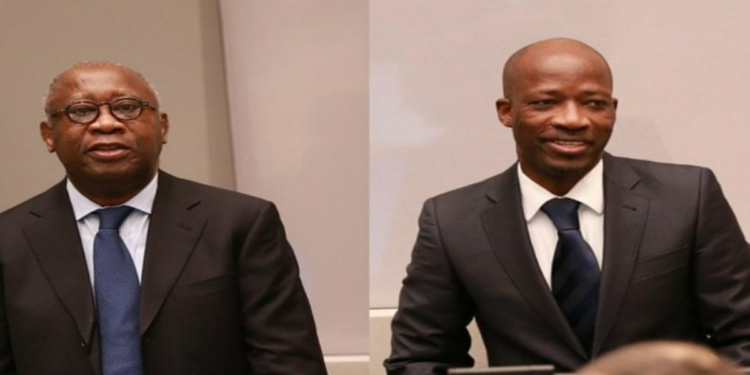By Thomas Verfuss
Laurent Gbagbo and Blé Goudé will hear on Tuesday if they are to be released from ICC custody or if they have to stay in detention pending further court proceedings.
The 73-year old former president Gbagbo has been in ICC custody for more than 7 years. He has made several previous requests for provisional release, all of which were rejected, with the presiding judge Cuno Tarfusser dissenting. Gbagbo’s former Minister of Sports Charles Blé Goudé has been in ICC custody since 2014.
The judges of the Trial Chamber will also rule on no-case-to-answer motions filed by the two accused. They argue that the prosecution has not presented sufficient evidence that might lead to a conviction for crimes against humanity like murder and rape during the post-election violence in Ivory Coast in 2010/2011. Observers in The Hague would not be surprised if one or two of the accused would be partially or totally acquitted (i.e. on some or all charges), as they consider the presentation of the evidence of the prosecution weak.
Even if Gbagbo and Blé Goudé are fully acquitted, the provisional release motion does not become moot, as the prosecution may argue that they should stay in detention pending a prosecution appeal against the acquittal decision.
As for the provisional release motions: contrary to what some think, freedom during pre-trial and trial proceedings is the rule and detention the exception. It is up to the prosecution to convince the judges that there are circumstances that justify the detention, like the risk that the suspect might flee and hide or that the suspect might intimidate or bribe witnesses.
After the Uhuru Kenyatta and William Ruto cases collapsed, some have argued that this rule should not be applied the same way at the ICC, because of the extreme gravity of the crimes (more than a thousand dead) and the position of power of the president and vice-president of Kenya that enhanced the possibility of witness tampering.
In the Gbagbo case, observers note the length of more than 7 years of detention without conviction. It took more than 4 years after his transfer to The Hague before the trial even started. Initially, the evidence of the prosecution was too weak to get the charges confirmed by the judges of the pre-trial chamber, and additional investigations had to be done.
The defence points out that the prolonged detention is detrimental to the health of the almost 74-year-old former president.
Gbagbo’s supporters prematurely celebrated in the streets of Abidjan mid-December after the fake news spread that he had already been released. Actually, it is not easy to release a detainee of an international court quickly, even if the decision of the judges has been taken. The ICC and the International Criminal Tribunal for the former Yugoslavia, which also had its seat in The Hague, have no territory to release a suspect to, unlike a national court. They depend on the goodwill of a state that is prepared to host the suspect. When their presence in The Hague is required for further proceedings, it would be most logical that The Netherlands be that host state. In the past, the Dutch government almost always refused to let ICC suspects roam free on its territory, even if international judges had decided that further detention was not warranted. Former vice-president Jean-Pierre Bemba of DR Congo could not be provisionally released during his trial, though the trial chamber did not consider further detention necessary. Defence and human rights lawyers have denounced this state of affairs: they quite rightly argue that is up to judges and up to judges only to decide if somebody should stay in the cell, and not up to some immigration bureaucrats.
As for Gbagbo and Blé Goudé, negotiations may have been going on with Belgium to see if this neighbouring country of The Netherlands would temporarily host them during provisional release. They could then spend weekends there and other days when their presence in The Hague is not required for court hearings.







